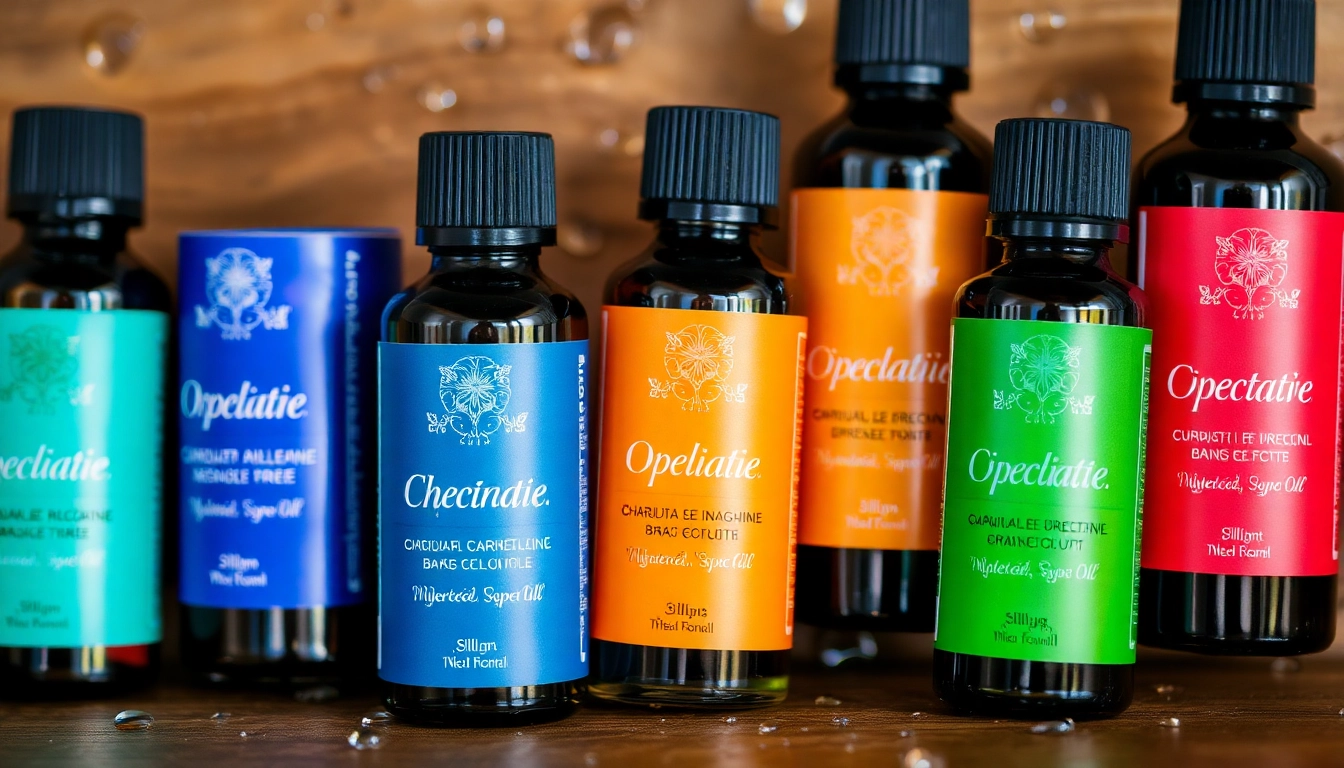Understanding Essential Oils
What Are Essential Oils?
Essential oils are concentrated plant extracts that capture the natural fragrance and beneficial properties of a plant. These oils are obtained from various parts of a plant, including leaves, flowers, bark, and roots, and are known for their distinctive aromatic characteristics. Rich in flavor and scent, these oils have been used for centuries in traditional medicine systems around the world, valued not only for their potent fragrances but also for their therapeutic effects.
In recent years, the popularity of essential oils has surged, leading many individuals to explore ways of incorporating them into their daily lives. The versatility of essential oil applications ranges from aromatherapy and skin care to household cleaning solutions, making them a staple in holistic health practices.
How Essential Oil Extraction Works
The extraction of essential oils involves various methods, with the most common being steam distillation, cold pressing, and solvent extraction. Each method is tailored to the specific type of plant and its desired characteristics.
- Steam Distillation: This is the most widely used method, where steam is passed through plant material to vaporize the volatile compounds. The steam and oils are then condensed back into a liquid, allowing for the separation of the oil from the water.
- Cold Pressing: Typically used for citrus fruits, this method involves mechanically pressing the peels to release the oil. It retains the oil’s natural aroma and therapeutic properties.
- Solvent Extraction: This technique is often used for delicate flowers. Solvents such as hexane or ethanol are used to extract the essential oil, later being removed to leave pure oil.
Understanding the extraction process is vital for consumers who want to choose high-quality essential oils, as the extraction method can impact the oil’s purity, potency, and safety.
Types of Essential Oils and Their Uses
There are a wide variety of essential oils available, each possessing unique properties and applications. Here are some of the most popular essential oils and their uses:
- Lavender: Known for its calming effects, lavender oil is often used in aromatherapy to promote relaxation and sleep.
- Tea Tree: This oil has powerful antibacterial and antifungal properties, making it excellent for skin health and acne treatment.
- Peppermint: A refreshing oil that aids in digestion, headache relief, and enhances focus when used in diffusers.
- Eucalyptus: Known for its respiratory benefits, eucalyptus oil is often used to relieve congestion and promote easier breathing.
These essential oils not only improve well-being but also enhance the atmosphere of a space, making them valuable in both personal and therapeutic settings.
Benefits of Essential Oils
Essential Oil Benefits for Health and Wellness
Essential oils provide numerous health benefits that can enhance overall wellness. Here are some key benefits:
- Stress Reduction: Aromatherapy with essential oils such as chamomile and ylang-ylang significantly reduces stress levels and promotes mental clarity.
- Pain Relief: Oils like peppermint and rosemary have analgesic properties that can alleviate headaches, muscle pain, and joint discomfort.
- Immune Support: Oils such as lemon and tea tree have been shown to support the immune system, helping to prevent illness and fight infections.
The holistic approach of using essential oils appeals to those seeking natural alternatives to conventional medicine, and their integration into daily routines can foster a deeper connection to personal health.
Top Essential Oils for Stress Relief
Stress is a modern-day affliction that can adversely affect our physical and mental health. Certain essential oils have been scientifically shown to provide calming benefits:
- Lavender: This oil is renowned for its sedative properties, making it ideal for relaxation and restful sleep.
- Bergamot: Extracted from a citrus fruit, bergamot oil can lower stress hormones and promote a positive mood.
- Frankincense: Often used in meditation, it reduces anxiety and enhances feelings of peace.
Incorporating these oils into your environment—through diffusing, topical application, or inhalation—can create a calming atmosphere conducive to stress relief.
Using Essential Oils for Skin Health
Essential oils are increasingly recognized for their skincare benefits as they can nourish and rejuvenate the skin. Here are a few popular essential oils and their skincare applications:
- Tea Tree Oil: Effective in treating acne due to its antibacterial properties; it can also help control oil production.
- Rosehip Oil: Rich in vitamin C, it aids in skin regeneration and reduces scarring and signs of aging.
- Geranium Oil: Balances oil production, improves skin elasticity, and promotes a vibrant complexion.
Using essential oils for skin health can provide a natural skincare routine and enhance overall skin appearance.
Incorporating Essential Oils into Your Daily Routine
Essential Oil Diffusion Techniques
Diffusing essential oils is a popular way to enjoy their benefits throughout your space. Here are various methods of diffusion:
- Ultrasonic Diffusers: These devices use water and ultrasonic waves to disperse essential oil particles into the air.
- Heat Diffusers: Utilizing heat to evaporate oils, these diffusers can alter the chemical structure of oils, so caution is advised.
- Inhalers: Portable inhalers allow for on-the-go aromatherapy, ideal for quick stress relief or energy boosts.
Choosing the method that suits your lifestyle can enhance the enjoyable experience of using essential oils.
DIY Essential Oil Recipes
Creating your own essential oil blends can not only be fun but also allow you to customize scents for specific needs. Here are a couple of simple DIY recipes:
- Calming Lavender Spray: Combine 2 cups of water with 15 drops of lavender oil in a spray bottle for a calming room spray.
- Refreshing Citrus Oil Blend: Mix 10 drops of lemon oil, 5 drops of peppermint oil, and 5 drops of orange oil in a diffuser for a refreshing atmosphere.
Experimenting with different combinations can help you discover your preferred scents and benefits.
Safety and Precautions when Using Essential Oils
While essential oils offer many benefits, safety remains paramount:
- Always dilute essential oils with a carrier oil before applying them to the skin.
- Conduct a patch test to check for allergies or adverse reactions.
- Store essential oils in a cool, dark place to maintain their potency and safety.
Understanding these precautions will help ensure a safe and enjoyable essential oil experience as you integrate them into your wellness routine.
Essential Oils vs. Synthetic Fragrances
Understanding the Differences
Essential oils and synthetic fragrances diverge significantly in composition and overall benefits. Essential oils are derived purely from natural sources, while synthetic fragrances are concocted from chemical compounds:
- Natural vs. Artificial: Essential oils maintain their natural molecular structure, providing therapeutic effects, while synthetic fragrances may lack any beneficial properties.
- Allergies and Sensitivities: Many individuals experience allergies to synthetic fragrances, yet essential oils often have fewer adverse reactions when used safely.
Choosing essential oils over synthetic fragrances supports a more holistic and health-conscious lifestyle.
Why Choose Essential Oils?
The decision to use essential oils comes with numerous advantages:
- Therapeutic Properties: Essential oils can naturally support physical and emotional health without the harsh side effects often associated with synthetic products.
- Diversity of Use: From personal care to household cleaning, essential oils boast a range of uses that make them multifunctional.
Investing in quality essential oils provides lasting benefits that extend across numerous aspects of daily life, contributing to overall well-being.
Environmental Impact of Essential Oils
The impact of essential oil production on the environment is an important consideration in sustainability:
- Sustainable Sourcing: Many reputable brands prioritize sustainable harvesting practices to prevent ecological harm.
- Biodiversity: Choosing essential oils from diverse plant sources can support biodiversity and promote environmental integrity.
Consumers can play a vital role in encouraging sustainability by sourcing oils from brands committed to ethical practices.
Conclusion and Next Steps
Recap of Essential Oil Benefits
Essential oils are a powerful addition to any wellness routine. Ranging from their therapeutic properties to their natural scents, they provide numerous benefits for not only physical health but also emotional well-being. Their versatility allows for integration into various lifestyles, and they can serve as effective alternatives to synthetic products.
Finding Quality Essential Oils
When sourcing essential oils, it is essential to prioritize quality. Look for brands that provide:
- Clear labeling on the source and extraction method.
- Third-party testing to ensure purity and potency.
- Transparent business practices demonstrating sustainability.
By selecting high-quality oils, you can ensure that you receive all the benefits that essential oils have to offer.
Joining the Essential Oil Community
The essential oil community is vibrant and welcoming. Engaging with others who share your interest can lead to greater insights and knowledge. Consider participating in online forums, local workshops, or social media groups dedicated to essential oils to share experiences, recipes, and tips.
By fostering connections within this community, you can enhance your understanding and enjoyment of essential oils, ultimately enriching your personal wellness journey.



